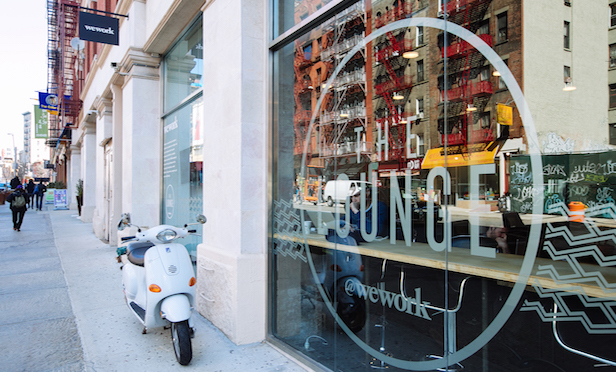 WeWork's first location in SoHo/ Image credit: WeWork blog
WeWork's first location in SoHo/ Image credit: WeWork blog
NEW YORK CITY—WeWork now claims the accomplishment of being the number one occupier of office space in Manhattan based on square footage. The Wall Street Journal first reported this news noting the flexible co-working space provider leases 5.3 million square feet of office space. WeWork says with its lease of 258,344 square feet at 21 Penn Plaza it has topped the 5.2 million square feet of office space that JPMorgan Chase owns or rents.
On the company blog, WeWork's chief development officer Granit Gjonbalaj describes how the company, that was founded in 2010, began with a single floor in one building in SoHo. But it grew to exceed the space of “the four banking giants that have dominated the commercial real estate market for years.” WeWork has approximately 60 locations across New York City with more than 50 in Manhattan.
Gjonbalaj states WeWork became the largest private occupier of office space in London and Washington, DC, earlier this year. He adds the company has over 300 locations in 87 cities, in 23 countries across the world.
A Cushman & Wakefield co-working report published in August found that nearly half of the current co-working space across the country has sprouted since 2015. This includes more than 5 million square feet of new space in each of the past three years. Yet Cushman notes co-working is still only 1% or 47.8 million square feet of the 5 billion square feet that the firm tracks across 87 markets.
Manhattan is the largest co-working market in the US. Earlier this summer CBRE reported flexible office space leased in Manhattan has increased 600% since 2009. Yet co-working still accounts for less than 3% of office space in Manhattan, according to both Cushman and CBRE.
Cushman states half of co-working spaces are in six gateway markets: Manhattan, Los Angeles, San Francisco, Chicago, Washington, DC and Boston. It accounts for between 1% to 3% of office space in each of these cities.
“Based on current near-term projections, co-working space could easily triple from its current share in gateway markets over the next decade,” says Revathi Greenwood, Cushman's head of Americas research. “Total inventory could increase to over 5% of office space in many urban markets and as high as 10% in some markets.”
“Occupiers' demand for flexibility is not going anywhere,” says David C. Smith, VP and head of Americas occupier research at Cushman. “The largest co-working providers continue to expand their portfolios at a dramatic pace.”
In addition to WeWork, Knotel, Spaces and Convene have recently leased additional property in Manhattan.
One competitor Servcorp anticipates flexible workspace to attain a much larger section of the CRE market supplied by a mix of landlords and operators. Marcus Moufarrige, the company's COO, says “WeWork is trying to grab land in that state of change and they have deep pockets to do it.” As to the co-working business in general, there are precautions. “You have to remember that very few businesses that have gone purely for market share by selling something for a lot less than they buy it ever make a sustainable long-term business model,” says Moufarrige.
WeWork was also in the news for a major settlement with the New York attorney general's office. The company agreed to stop using non-compete agreements which the NYAG found overly broad. Almost all employees nationally and all of the New York employees were required to sign the non-competes according to New York attorney general Barbara Underwood.
“Workers should be able to take a new job without living in fear of a lawsuit from their former employer,” says Underwood. She states too often non-competes are misused, especially with low-wage workers. This can limit employees' opportunities and prevent businesses from hiring the best candidate.
As of April 2018, WeWork employed nearly 3,300 people nationwide, 2,300 in New York. The NYAG says the non-competes prohibited all levels of employees from working for competitors after leaving the company, regardless of job duties, knowledge of confidential information, or compensation. Both the Illinois attorney general and the New York attorney general began investigations and coordinated the resolution.
A WeWork spokesperson responded to GlobeSt.com with the following statement:
“For the past two years, WeWork has worked collaboratively with the Illinois and New York attorneys general to review our use of non-compete agreements. WeWork was already in the process of revamping our employee processes and we welcomed the input of the attorneys general. We are pleased to confirm that we now have updated documents developed collaboratively with these two attorneys general that are responsive to WeWork's growth.”
© 2025 ALM Global, LLC, All Rights Reserved. Request academic re-use from www.copyright.com. All other uses, submit a request to [email protected]. For more information visit Asset & Logo Licensing.





